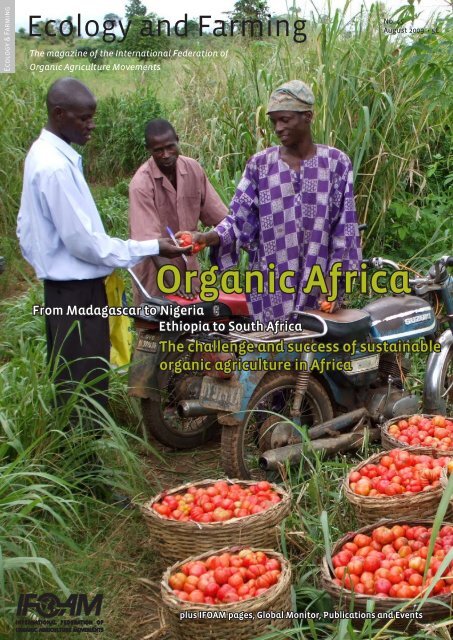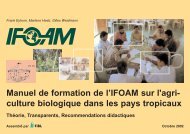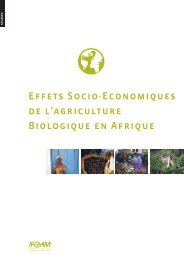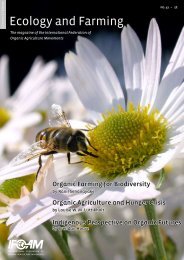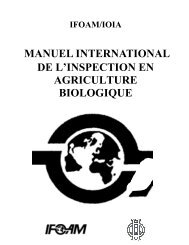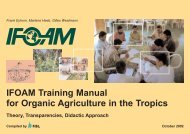Preview PDF
Preview PDF
Preview PDF
Create successful ePaper yourself
Turn your PDF publications into a flip-book with our unique Google optimized e-Paper software.
Ecology & Farming<br />
Ecology and Farming<br />
The magazine of the International Federation of<br />
Organic Agriculture Movements<br />
No. 45<br />
August 2009 • 5€<br />
Organic Africa<br />
From Madagascar to Nigeria<br />
Ethiopia to South Africa<br />
The challenge and success of sustainable<br />
organic agriculture in Africa<br />
plus IFOAM pages, Global Monitor, Publications and Events
Imprint<br />
Table of Contents<br />
Ecology and Farming is the magazine<br />
of the International Federation<br />
of Organic Agriculture Movements<br />
(IFOAM).<br />
ISSN No. 1016-5061<br />
IFOAM Head Office:<br />
Charles-de-Gaulle-Str. 5<br />
53115 Bonn<br />
Germany.<br />
Tel: +49 - 228 - 926 - 5010<br />
Fax: +49 - 228 - 926 - 5099<br />
Email: headoffice@ifoam.org<br />
www.ifoam.org<br />
Managing Editor<br />
Richard Sanders<br />
Design<br />
Arnd Zschocke<br />
Sub-editor<br />
Joy Michaud<br />
Letters to the Editor:<br />
All articles and correspondence solely<br />
concerned with Ecology and Farming<br />
should be sent to letters@ifoam.org<br />
Subscriptions and advertisements:<br />
All subscription and advertising queries<br />
should be directed to the IFOAM Head<br />
Office.<br />
Subscription Rate (6 issues/two years):<br />
25 Euros; One may subscribe via the<br />
IFOAM webshop or by contacting the<br />
IFOAM Head Office.<br />
Reprints: Permission is granted to reproduce<br />
original articles providing the credit<br />
is given as follows:<br />
‘Reprinted with permission from<br />
Ecology and Farming, IFOAM, Charlesde-Gaulle-Str.<br />
5, 53113, Bonn, Germany.’<br />
Contributions: Articles sent for inclusion<br />
in Ecology and Farming should be<br />
no longer than 1500 words. They should<br />
be sent by email to letters@ifoam.<br />
org. If this is not possible, a copy can be<br />
faxed or sent by post.<br />
Authors are responsible for the content of<br />
their own articles. Their opinions do not<br />
necessarily express the views of IFOAM.<br />
Cover Photo: Tomato Farmers in<br />
Nigeria by Dr. Olugbenga Adeoluwa<br />
1 Editorial<br />
2<br />
4<br />
9<br />
12<br />
16<br />
21<br />
24<br />
28<br />
31<br />
34<br />
37<br />
40<br />
42<br />
46<br />
49<br />
52<br />
55<br />
56<br />
57<br />
IFOAM Pages<br />
Organic Agriculture Can Help Africa<br />
by Andre Leu<br />
Organic Farming - Continued Growth in Africa<br />
by Hervé Bouagnimbeck<br />
Organic Agriculture in Africa – A Case Study of<br />
the EPOPA Project<br />
by Alastair Taylor<br />
Organic Agriculture and HIV/AIDS<br />
by Julia Wright<br />
Mainstreaming Gender in Organic Agriculture<br />
by Edith Kunihira<br />
Ethiopia - On the Road to an Organic Future<br />
by Addisu Alemayehu & Mohammed Kiyar<br />
The Tigray Project:<br />
by Sue Edwards & Hailu Araya<br />
Organic Agriculture in Higher Education in<br />
West Africa<br />
by I.O.O. Aiyelaagbe, P.J.C. Harris, E. Trenchard and J.J. Atungwu<br />
Organic Family Agriculture or Capitalintensive<br />
Agriculture in Africa<br />
by Ibrahima Seck<br />
Innovating with Natural Pesticides to Produce<br />
Organic Cotton In Lira District In Uganda<br />
by Florence Nagawa & Lucy Senya<br />
Organic Agriculture in Madagascar<br />
by Njaka Rajaonarison<br />
Food Production, Biodiversity and Water Use<br />
in South Africa<br />
by Raymond Auerbach<br />
Gaining control<br />
by Michael Hauser<br />
Participatory Guarantee Systems in Africa<br />
by Joelle Katto-Andrighetto & Raymond Auerbach<br />
Global Monitor<br />
IFOAM Publications<br />
Other Publications<br />
Calendar of Events 2009
RAPUNZEL has more than 30 years<br />
of experience in importing,<br />
processing and distributing the<br />
finest organic certified food<br />
worldwide.<br />
RAPUNZEL promotes organic<br />
agriculture and manages its own<br />
projects in Turkey (dried fruit and<br />
nuts), Spain (olives and almonds)<br />
and Sri Lanka (coconut).<br />
Additionally, we assist organic<br />
projects in more than 20 countries<br />
throughout the world, for example<br />
in Brazil (cane sugar), Bolivia<br />
(cocoa, Brazil nuts, quinoa), Costa<br />
Rica (cane sugar, dried bananas),<br />
the Dominican Republic (cocoa and<br />
coffee) and Tanzania (coffee).<br />
For complete information contact: RAPUNZEL NATURKOST AG • Rapunzelstr. 1 • D-87764 Legau, Germany • Phone: + 49-8330-529-1133 • Fax: + 49-8330-529-1139 • www.rapunzel.de<br />
Grolink<br />
’There is not one developed and<br />
one underdeveloped world.<br />
There is only one world<br />
that is badly developed’<br />
Always ahead in development<br />
We pioneer new areas and concepts in the organic sector. We develop<br />
in-house quality assurance systems, and are innovators in new product<br />
areas such as organic wild production and fisheries. We conduct<br />
training programmes for sector leaders and policy makers. We also<br />
have considerable long-term experience with the organic market.<br />
We enjoy to find new ways (or discover old ways) to guarantee the<br />
organic integrity.<br />
Consultancy • Intelligence • Marketing<br />
Project design • Certification development<br />
Standards development • Advanced training<br />
Grolink<br />
www.grolink.se<br />
Serving the organic world<br />
info@grolink.se • www.grolink.se • Address: Torfolk, SE-684 95 Höje, Sweden • Phone: +46 563 723 45 • Fax: +46 563 720 66<br />
The Organic Standard is a monthly journal published by Grolink. Distributed by email as a pdf file<br />
the journal deals with issues concerning international organic standards, regulations and certification.
Ecology & Farming | August 2009<br />
Editorial<br />
This issue of Ecology and<br />
Farming with its focus on<br />
Africa comes at a critical<br />
time, when organic agriculture<br />
is taking center<br />
stage and rapidly growing<br />
across the whole continent.<br />
The world is currently witnessing<br />
two major challenging<br />
situations; climate<br />
change and the global economic<br />
crisis. These two have tested to the limit,<br />
the earlier held assumption by most development<br />
partners that the problems facing African agriculture<br />
require increased use of synthetic fertilizers<br />
and pesticides to tackle chronic food shortages.<br />
In Africa, this techno-fix route had already<br />
been packaged in major, continent-wide programs<br />
framed as the “Africa Green Revolution”.<br />
The cost of synthetic fertilizers has gone up more<br />
than three fold in the last three years and is therefore<br />
not sustainably affordable by the majority<br />
of the rural population in Africa that are largely<br />
smallholder farmers. In addition, fertilizers alone<br />
are no solution for the now increasing effects of<br />
climate change where farmers across Africa are<br />
witnessing unpredictable weather and longer<br />
droughts, along with fragile ecosystems that are<br />
making farming almost impossible and exposing<br />
vulnerable farming communities to even more<br />
uncertainty.<br />
It therefore follows that the solution to the current<br />
farming and food dilemma in Africa cannot<br />
be found in the intensification of use of synthetic<br />
fertilizers and pesticides but in the intensification<br />
of the ecosystem itself, and in the organization<br />
of smallholder farmers for more collective action.<br />
This has always been the basis for organic<br />
agriculture.<br />
There is now a wave of realization across Africa<br />
from policy makers to the farmers and other value<br />
chain actors, that the sustainable and most appropriate<br />
option to the current challenges within<br />
the African limitations, do largely lie in organic<br />
systems. The visible evidence of economic empowerment<br />
to communities and food security<br />
that has been seen in organic projects across<br />
Africa such as the Tigray project in Ethiopia, the<br />
EPOPA project in Uganda and Tanzania and other<br />
organic projects across many African countries<br />
all the way from West Africa (in countries like<br />
Ghana, Nigeria, Senegal etc), to Eastern, Central<br />
and southern African countries (e.g. Zambia,<br />
Zimbabwe, Kenya, Rwanda and Burundi are a<br />
clear testimony to this wave of change.)<br />
In countries like Uganda, trade and exports in organic<br />
products have been growing at an average<br />
of 60 per cent a year, and thousands of smallholder<br />
farmers are converting to organic agriculture to<br />
tap into the visible benefits of income generation<br />
through the growing organic trade and sustainable<br />
production of food within the natural resources<br />
available.<br />
Against this background, the organic movement<br />
across Africa is re-organizing and re- discovering<br />
itself as an undisputed pillar in the renaissance of<br />
African agriculture to meet new challenges. The<br />
recently held 1 st African Conference on Organic<br />
Agriculture in Kampala in May 2009 was one of<br />
these bold steps where scientists, private and public<br />
sector players joined hands to position organic<br />
agriculture and trade in Africa at the forefront of<br />
economic growth and trade across the continent.<br />
There is no doubt that with the scientists, industry<br />
players and now the policy makers joining<br />
hands to develop organic Agriculture in Africa,<br />
the sky is the limit for the growth of the organic<br />
sector across the continent. The commitment exhibited<br />
by the stakeholders so far gives real hope<br />
of maintaining the momentum in growth and the<br />
contribution of organic agriculture to solving<br />
the pressing food and agricultural challenges of<br />
Africa.<br />
Moses Kiggundu Muwanga, Uganda<br />
IFOAM Board Member<br />
email: mkmuwanga@nogamu.org.ug<br />
1


